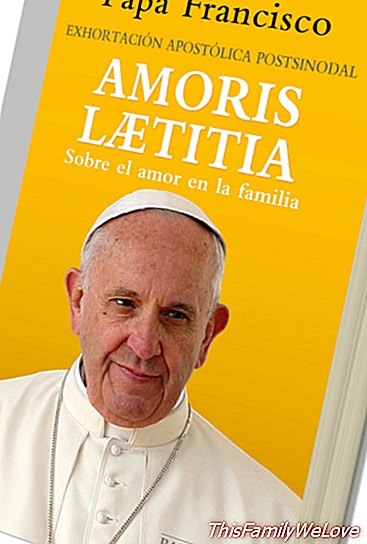The 10 councils of Pope Francis to take care of marriage
The Apostolic Exhortation has just seen the light Amoris laetitia (The joy of love), the text in which the Pope Francisco collects the conclusions of the reflection of the Church on family life. This book talks about marriage and children, crisis, education and, above all, joy.
Following the outline proposed by Saint Paul to the Corinthians (I Co 13.4-7), review the keys to take good care of marriage, which is the essential base to take care of the family (points 90 to 117):
10 tips to take care of marriage, according to Pope Francis
1. Patience. "To have patience is not to let them mistreat us continuously, or to tolerate physical aggressions, or to allow them to treat us as objects." The problem is when we demand that relationships be heavenly or that people be perfect, or when we place ourselves in the center and wait that only our own will is fulfilled, then everything makes us impatient, everything leads us to react with aggression (...) Love always has a sense of deep compassion that leads to accepting the other as part of this world, even when acting as a a different way than I would like. "

2. Service attitude. "Patience named in the first place is not a totally passive posture, but is accompanied by an activity, by a dynamic and creative reaction to others, indicates that love benefits and promotes others, which is why it is translated as helpful" .
3. Healing the envy. "True love values the achievements of others, does not feel them as a threat, and is freed from the bitter taste of envy, and accepts that each one has different gifts and different paths in life."
4. Without flaunting or enlarging. "Who loves, not only avoids talking too much about himself, but also because he is focused on others, he knows how to position himself in his place without pretending to be the center".
5. Detachment "We must avoid giving priority to self-love as if it were more noble than giving oneself to others (...) Love can go beyond justice and overflow for free, without expecting anything in return.
6. Without internal violence. That is, without "an internal reaction of indignation provoked by something external, it is an internal violence, a non-manifest irritation that puts us on the defensive before others, as if they were annoying enemies to be avoided." Feeding that aggressiveness Intimacy is useless, it only makes us sick and isolates us, indignation is healthy when it leads us to react to a grave injustice, but it is harmful when it tends to impregnate all our attitudes towards others ".

7. Sorry. "If we allow a bad feeling to penetrate our insides, we leave room for that grudge that grows old in the heart (...) The trend tends to be to look for more and more guilt, to imagine more and more evil, that of suppose all kinds of bad intentions, and thus the grudge grows and takes root.Thus, any mistake or fall of the spouse can damage the loving bond and the family stability.The problem is that sometimes it is given to all the same seriousness, with the risk of becoming cruel before any error of others.The just vindication of one's own rights becomes a persistent and constant thirst for revenge rather than a healthy defense of one's own dignity. "
8. Excuse everything. "Spouses who love each other and belong belong, they speak well of each other, they try to show the good side of the spouse beyond their weaknesses and errors, in any case, they keep silent so as not to damage their image (...) It is not the ingenuity of those who pretend not to see the difficulties and weaknesses of the other, but the breadth of view of those who place those weaknesses and errors in their context ".
9. Trust. "Confidence makes possible a relationship of freedom, it is not necessary to control the other, to follow its steps carefully, to prevent it from escaping from our arms, that freedom (...) allows the relationship to be enriched and not become a circle closed and without horizons (...) At the same time, it makes sincerity and transparency possible, because when one knows that others trust in him and value the basic goodness of his being, then he does show himself as he is, without concealments. "
10. Wait. "He always hopes that a maturation will be possible, a surprising outbreak of beauty, that the most hidden potentialities of his being will germinate some day, it does not mean that everything will change in this life, it implies accepting that some things do not happen as one wishes, but that perhaps God writes right with the crooked lines of a person and gets some good from the evils that she can not overcome on this earth ".
More information at: Amoris Laetitia, about love in the family. Pope Francisco.
If you want to read the first chapter, click here.




